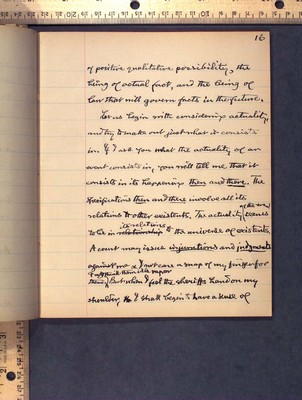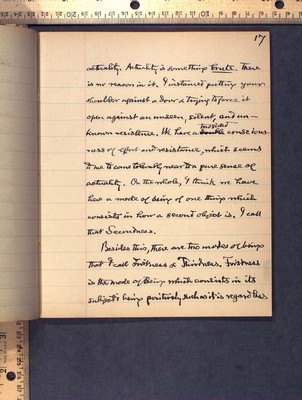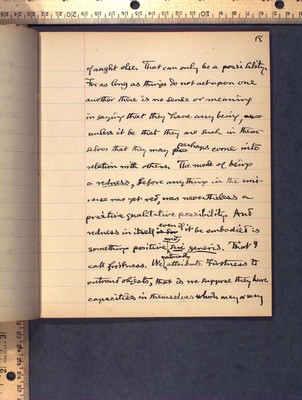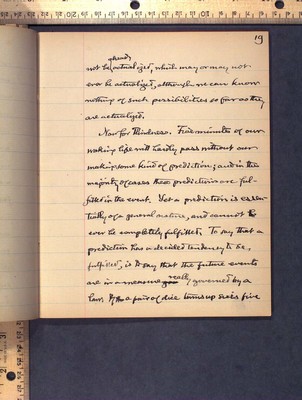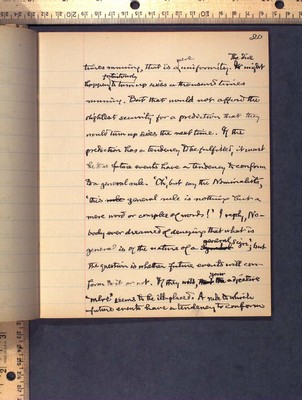Pages
17
16
of positive qualitative possibility, the being of actual fact, and the being of law that will govern facts in the future.
Let us begin with considering actuality, and try to make out just what it consists in. If I ask you what the actuality of an event consists in, you will tell me that it consists in its happening then and there. The specifications then and there involve all its relations to other existents. The actuality of the event seems to be in its relations to the universe of existents. A court may issue injunctions and judgments against me (?) and I not care a snap of my finger for them. I may think them idle vapor (insert) But when I feel the sheriffs hand on my shoulder, I shall begin to have a sense of
18
actuality. Actuality is something brute. There is no reason in it. I instanced putting your shoulder against a door and trying to force it open against and unseen, silent, and unknown resistance. We have a two sided consciousness of effort and resistance, which seems to me to come tolerably near to a pure sense of actuality. On the whole, I think we have here a mode of being of one thing which consists in how a second object is. I call that Secondness. Besides, this, there are two modes of being that I call Firstness and Thirdness. Firstness is the mode of Being which consists in its subject's being positively such as it is regardless
19
of aught else. That can only be a possibility. For as long as things do not act upon one another there is no sense or meaning in saying that they have any being, unless it be that they are such in themselves that they may perhaps come into relation with others. The mode of being a redness, before anything in the universe was yet red, was nevertheless a positive qualitative possibility. And redness in itself even if it be embodied is something positive and sui generis. That I call Firstness. We naturally attribute Firstness to outward objects, that is we suppose they have capacities in themselves which may or may
20
not be already actualized, which may or may not ever be actualized, although we can know nothing of such possibilities so far as they are actualized. Now for Thirdness. Five minutes of our waking life will hardly pass without our making some kind of predication; and in the majority of cases the predictions are fulfilled in the event. Yet a prediction is essentially of a general nature, and cannot ever be completely fulfilled. To say that a prediction has a decided tendency to be fulfilled, is to say that the future events are in a measure really governed by a law. If a pair of dice turns up sixes five
21
times running, that is a mere uniformity. The dice might happen fortuitously to turn up sixes a thousand times running. But that would not afford the slightest security for a prediction that they would turn up sixes the next time. If the prediction has a tendency to be fulfilled, it must be that future events have a tendency to conform to a general rule. 'Oh', but say the Nominalists, 'this general rule is nothing but a mere word or complex of words!' I reply, Nobody ever dreamed of denying that what is genera is of the nature of a general sign; but the question is whether the future events will conform to it or not. If they will, your adjective 'mere' seems to be ill placed. A rule which future events have a tendency to conform
